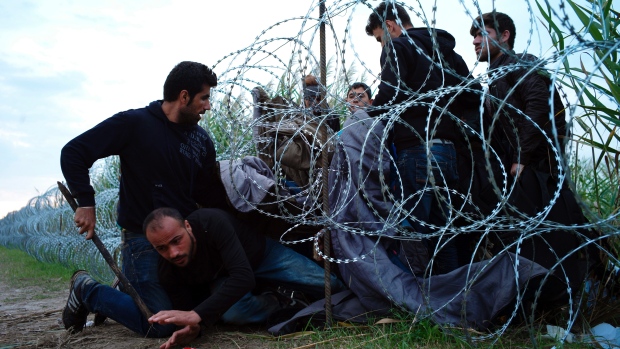By Tyler Pruett
tyler@southerntorch.com
Last Friday, the world watched in horror as jihadist aligned with the Islamic State carried out a coordinated attack in Paris. Over 120 people were killed, while many remain hospitalized and in intensive care. The terrorist, utilizing explosive vest and assault rifles, attacked six different locations. One location, The Stade de France, a stadium hosting a soccer match between France and Germany, was attacked by three suicide bombers. Luckily, none of the bombers were able to enter the stadium; killing only one person outside of the gates. If a security guard hadn’t of noticed an explosive-laden belt, the death toll would have undoubtedly been much higher. Among the debris of the first explosion, the bomber’s passport was found. The name, Ahmad al-Mohammad, and fingerprint matched a refugee who had arrived on the Greek island of Leros just a month earlier from Syria.
The suspected ISIS fighter arrived in a small boat with a group of refugees fleeing the war-ravaged country. An immigration official on the island remembers him specifically, telling the BBC’s Gabriel Gatehouse that something, “did not feel right about him….he kept to himself.” The official further stated that he would have alerted a security officer, had there been one. Instead, “Ahmad” was fingerprinted, photographed, and allowed entrance into Europe. From Greece, he traveled to Serbia, Croatia, and then France, living in refugee camps, and even appearing on video dancing with other refugees while in Serbia. It took al-Mohammad about a month to reach his target: Paris.
Since the Friday attacks, this individual is identified by the name on the passport found at the scene, but a passport with the same name and matching data, although with a different photo was discovered on a Syrian refugee unrelated to the attacks. This suggests that both were counterfeits possibly originating from the same source. More than likely, the stadium bomber’s identity is unknown, and Ahmad al-Mohammad is an alias. In the wake of the attacks, over thirty governors across America have barred refugees from resettling in their states. The Obama administration has defending the program, reassuring the public that the refugees are thoroughly screened, but this has done little to appease fears that another “Ahmad al-Mohammad” may be amongst them.
So what is the screening process for a Syrian refugee seeking asylum in the United States? According to the Department of State, the process takes between 18 and 24 months, and is, to quote the Deputy State Department Spokesman, “the most stringent security process for anyone entering the United States.” The process involves a security clearance check, several in-person interviews to confirm identity, and screening by the Department of Homeland Security and National Counterterrorism Center. The State Department is right in its assessment that the process is stringent, however what they fail to acknowledge is that in a country that has been at war with itself for years, little to no records exists to verify a person’s past or even identity. It amounts to trying to confirm someone’s identity by their appearance, when you have never seen them and don’t even have a photo to compare. As FBI Director James Comey stated last month in a testimony before Congress, “If we don’t know much about somebody, there won’t be anything in our data.” In other words, an individual could have fought on the front lines with ISIS since it’s formation, and if this individual never accesses jihadist websites, never communicates with known terrorists electronically that are being monitored, or is never arrested for terrorist activity, this dangerous individual is for all intents and purposes, an innocent refugee.
While the process for admittance is slow, the federal government is increasing the pace as it tries to admit more. The Obama administration has a goal of 10,000 admitted by the end of the current year, and it plans to increase that number to 85,000 by the end of fiscal year 2016. Today, Congress introduced a measure to strengthen the vetting process, however it was immediately vetoed by President Obama, chiding Republicans for attempting to slow down the process. While in my opinion, the greatest threat to our safety is lone wolf attacks by individuals who have lived in our country for years, the facts are that we cannot get a complete background image on anyone coming from Syria. The President claimed earlier this week that rhetoric coming from house Republicans fuels extremist acts, but let’s hope that those acts aren’t allowed to happen because of his naivety.





